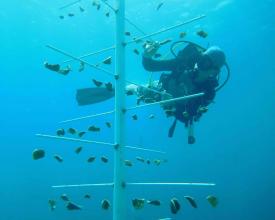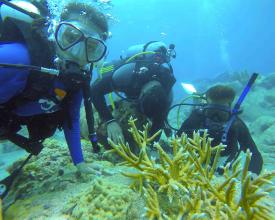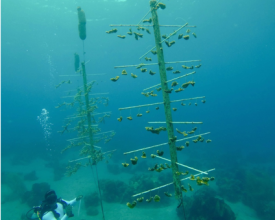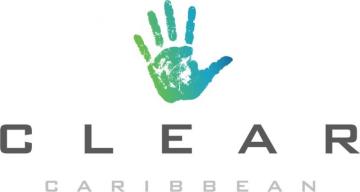
Restauration des coraux pour des écosystèmes résilients et des moyens de subsistance durables
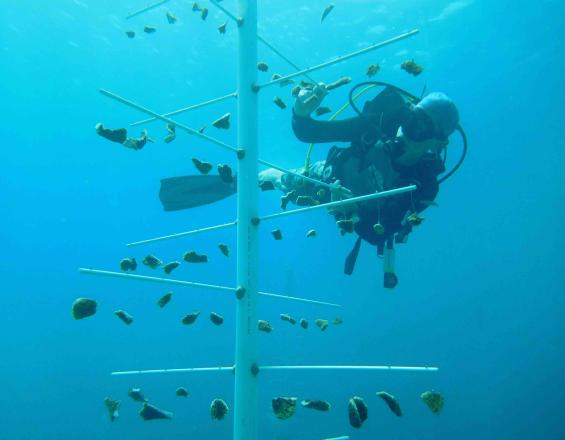
Le projet s'est concentré sur le renforcement des capacités de restauration des coraux à Sainte-Lucie en tant qu'adaptation au changement climatique basée sur l'écosystème. Des génotypes de coraux résistants de type corne d'élan et corne de staggart ont été sélectionnés dans les récifs locaux et multipliés dans des pépinières. Nous avons formé et soutenu les jardiniers de coraux locaux qui ont entretenu plus de 2 500 coraux dans les pépinières et replanté plus de 1 500 coraux âgés d'un an. Le projet a développé un partenariat public-privé avec la Fondation Sandals et le gouvernement de Sainte-Lucie, basé sur un mécanisme de financement durable pour s'assurer que les jardiniers de coraux puissent continuer à recevoir un revenu après la fin du projet. La formation a permis aux membres de la communauté d'acquérir des compétences en plongée sous-marine et des compétences spécialisées dans la restauration des coraux - y compris une nouvelle qualification professionnelle nationale dans la restauration des coraux. Ces nouvelles compétences ont permis à la communauté locale (en particulier aux jeunes adultes) de jouer un rôle plus important dans la gestion de leurs ressources côtières.
Impacts
- Augmentation des revenus des jardiniers du corail : les revenus supplémentaires ont bénéficié directement aux jardiniers du corail (hommes et femmes), mais aussi indirectement à leurs enfants et à leurs partenaires.
- Nouvelles possibilités de revenus futurs: le mécanisme de financement durable convenu entre CLEAR et la Sandals Foundation fournira des revenus aux jardiniers du corail lorsque les activités touristiques reprendront après que la pandémie de COVID-19 se sera calmée. La restauration des coraux par les communautés devrait être encouragée en priorité lors de la reprise verte après la pandémie de COVID-19.
- Augmentation de la résilience écologique : les coraux ont été multipliés à partir de fragments prélevés sur de grandes colonies sources qui présentaient des phénotypes très sains, qui avaient survécu à des épisodes de blanchiment antérieurs (c'est-à-dire qu'ils s'étaient adaptés à une TSM plus élevée), à des épidémies (par exemple la bande blanche) et à une mauvaise qualité de l'eau (par exemple des sédiments et une forte teneur en nutriments pendant la saison des pluies). Différents génotypes ont été plantés en grappes afin de favoriser une reproduction sexuelle efficace et une plus grande diversité génétique (c'est-à-dire une plus grande résilience).
- Augmentation de la résilience sociale. L'amélioration de la santé, de la résilience et de la rugosité des récifs coralliens frangeants peu profonds (<7m) est particulièrement importante pour les communautés côtières, car elle améliore la protection des côtes contre les tempêtes et l'élévation du niveau de la mer, l'approvisionnement en nourriture grâce à la pêche et les revenus du tourisme.
